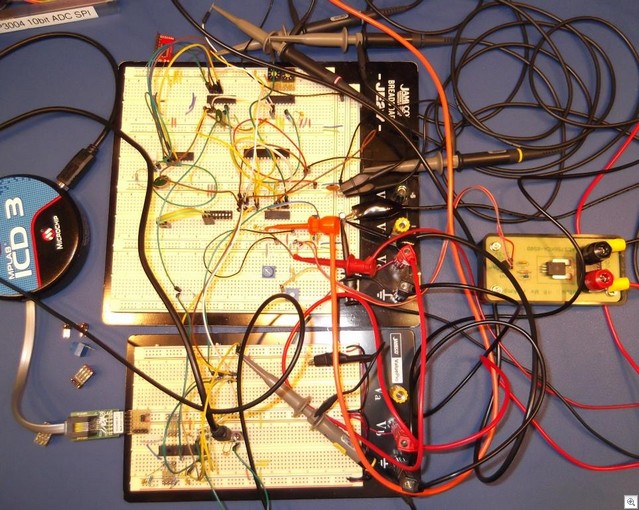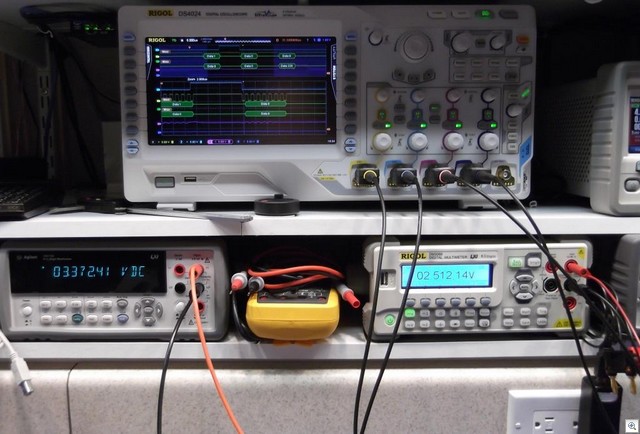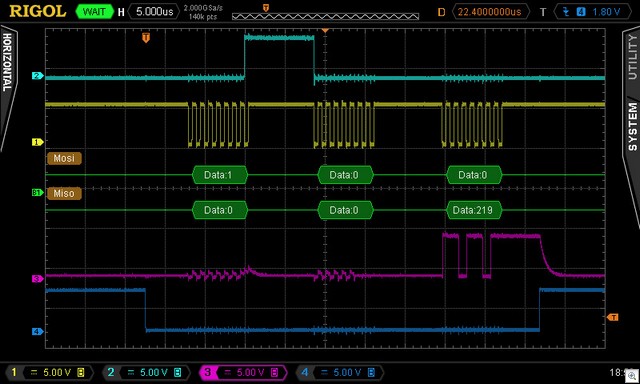As I continue to use the Microchip C18 compiler I find more and more issues. Microchip’s idiots appear to have left the peripherals lib out of the linker for the PIC18F2x/45K50 chips.
After changing over to use the K22 series of microcontrollers (specifically the PIC18F26K22), I found that the SPI libraries are missing from the linker. The USART libraries are there, but not the SPI.
Programs using SPI compile just fine, but won’t link…
Keep it up Microchip, and you may yet convince everyone to use Atmel.
So, I switched to an older compiler, version 3.40, and it works fine.
Here’s the code:
/*
* Uses SPI to read an MCP3004, and writes the results to the serial port.
*/
#include <p18F26K22.h>
#include <usart.h>
#include <stdio.h>
#include <stdlib.h>
#include <spi.h>
#include <delays.h>
#pragma config FOSC = INTIO7 //, MCLRE = ON
#pragma WDTEN = 0; // Disable the watchdog timer
/*
IRCF<2:0>: Internal RC Oscillator Frequency Select bits(2)
111 = HFINTOSC ? (16 MHz)
110 = HFINTOSC/2 ? (8 MHz)
101 = HFINTOSC/4 ? (4 MHz)
100 = HFINTOSC/8 ? (2 MHz)
011 = HFINTOSC/16 ? (1 MHz)(3)
*/
unsigned char msb1, msb2, lsb1, lsb2;
int ch_data;
/* SPI pins
* 14 SCK
* 15 SDI = MISO
* 16 SDO = MOSI */
#define ADC_CS PORTCbits.RC2 // pin 13 = chip select for ADC
void main(void)
{
OSCCONbits.IRCF = 0b101; //change Fosc to 4Mhz
ANSELC = 0; //Analog ports set to digital
// Have to explicitly set the IO on the SPI pins
TRISCbits.RC2 = 0; // Chip Select ADC_CS
TRISCbits.RC3 = 0; // SCK 1
TRISCbits.RC4 = 1; // SDI 1
TRISCbits.RC5 = 0; // SDO 1
OpenSPI1(SPI_FOSC_16, MODE_11, SMPEND);
Delay10TCYx(5);
ADC_CS = 1; // disable chip
// Open the USART configured as 8N1, 2400 baud, in polled mode
Open1USART (USART_TX_INT_OFF &
USART_RX_INT_OFF &
USART_ASYNCH_MODE &
USART_EIGHT_BIT &
USART_CONT_RX &
USART_BRGH_HIGH, 103);
// write a break and Hello to the serial port.
putrs1USART(“\n\n\n\n\n\n\r !!! hello !!! \n\r”);
Delay10TCYx(1);
while (1) {
ADC_CS = 0; // pull chip select low RA4
WriteSPI1(0x01);
msb1 = ReadSPI1();
lsb1 = ReadSPI1();
ADC_CS = 1; // disable chip
ch_data = msb1;
ch_data = ch_data << 8;
ch_data = ch_data + lsb1;
// write the data to the serial port
printf(“MSB,LSB %d,%d combined: %d\r\n”,msb1,lsb1,ch_data);
Delay10TCYx(200);
}
}



